Latest Sheet Music
Koji Kondo

Koji Kondo (近藤浩治 Kondō Kōji?, born August 13, 1960) is a Japanese video game composer and sound director who has been employed at Nintendo since 1984. He is best known for scoring numerous titles in the Mario and The Legend of Zelda series.
Gavin DeGraw

Gavin DeGraw (born February 4, 1977) is an American singer-songwriter and musician.
Originally, DeGraw started in Manhattan clubs alongside local pianists Andrew West and Lenny Revell, drawing several of his home town fans. He made his big break when "I Don't Want to Be" was chosen as the theme song for the teen drama One Tree Hill. The song has also been performed on American Idol, Australian Idol and Idol (Norway and Sweden) by various contestants during different seasons. Two of DeGraw's other songs, "Follow Through" and "Chariot," have also achieved popularity and radio play. His song "We Belong Together" was also featured in the 2006 film Tristan and Isolde. In 2004, DeGraw released an acoustic version of his album Chariot called Chariot Stripped. DeGraw and his band recorded the album live in the studio, in only one take on the vocals, seeking an intimate effect.
Originally, DeGraw started in Manhattan clubs alongside local pianists Andrew West and Lenny Revell, drawing several of his home town fans. He made his big break when "I Don't Want to Be" was chosen as the theme song for the teen drama One Tree Hill. The song has also been performed on American Idol, Australian Idol and Idol (Norway and Sweden) by various contestants during different seasons. Two of DeGraw's other songs, "Follow Through" and "Chariot," have also achieved popularity and radio play. His song "We Belong Together" was also featured in the 2006 film Tristan and Isolde. In 2004, DeGraw released an acoustic version of his album Chariot called Chariot Stripped. DeGraw and his band recorded the album live in the studio, in only one take on the vocals, seeking an intimate effect.
Jaya Suprana
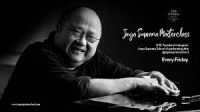
Jaya Suprana, (née Phoa Kok Tjiang) is an Indonesian pianist, composer, conductor, writer, cartoonist, and television presenter.Jaya Suprana was born in Denpasar, Bali as a Chinese descendant, but grew up within Javanese culture. He studied music at Musikhochschule Münster and Folkwang-Hochschule Essen, West Germany, between 1967 and 1976, and since then has given piano recitals worldwide, as well as composing his own music. He also presents his own national weekly talkshow called the Jaya Suprana Show. His daily writings have appeared in the daily newspapers Kompas, Suara Pembaruan, Sinar Harapan, on-line media such as RMOL, Askara, SMSI and books published by Elex Media Komputindo.
Real Book

The Real Book refers to compilations of lead sheets for jazz standards. It usually refers to the first volume of a series of books transcribed and collated by Berklee College of Music students during the 1970s.The name is derived from "fake books", so called because they contained only rough outlines of music pieces rather than fully notated scores. Early fake books were often used by professional bands who performed mostly standards, often more geared to society and dance bands rather than jazz ensembles, and devoted much space to show tunes, novelty tunes, traditional jazz, etc. The first three Real Book volumes, in contrast, contained many bebop and other jazz standards that were likely to be encountered on jazz gigs at the time. For this reason, the books were quickly adopted among jazz players in the 1970s, particularly on the east coast.
Marie Cowan

Marie Cowan is not an Australian Music Centre represented artist, however the following works can be found in our collection:
Traditional

The Beatles

The Beatles were a pop and rock group from Liverpool, England formed in 1960. Primarily consisting of John Lennon (rhythm guitar, vocals), Paul McCartney (bass guitar, vocals), George Harrison (lead guitar, vocals) and Ringo Starr (drums, vocals) throughout their career, The Beatles are recognised for leading the mid-1960s musical "British Invasion" into the United States. Although their initial musical style was rooted in 1950s rock and roll and homegrown skiffle, the group explored genres ranging from Tin Pan Alley to psychedelic rock. Their clothes, styles, and statements made them trend-setters, while their growing social awareness saw their influence extend into the social and cultural revolutions of the 1960s. After the band broke up in 1970, all four members embarked upon solo careers.
The Beatles are one of the most commercially successful and critically acclaimed bands in the history of popular music, selling over a billion records internationally. In the United Kingdom, The Beatles released more than 40 different singles, albums, and EPs that reached number one, earning more number one albums (15) than any other group in UK chart history. This commercial success was repeated in many other countries; their record company, EMI, estimated that by 1985 they had sold over one billion records worldwide. According to the Recording Industry Association of America, The Beatles have sold more albums in the United States than any other band. In 2004, Rolling Stone magazine ranked The Beatles number one on its list of 100 Greatest Artists of All Time. According to that same magazine, The Beatles' innovative music and cultural impact helped define the 1960s, and their influence on pop culture is still evident today. In 2008, Billboard magazine released a list of top-selling Hot 100 artists to celebrate the chart's fiftieth anniversary; The Beatles reached #1 again.
The Beatles are one of the most commercially successful and critically acclaimed bands in the history of popular music, selling over a billion records internationally. In the United Kingdom, The Beatles released more than 40 different singles, albums, and EPs that reached number one, earning more number one albums (15) than any other group in UK chart history. This commercial success was repeated in many other countries; their record company, EMI, estimated that by 1985 they had sold over one billion records worldwide. According to the Recording Industry Association of America, The Beatles have sold more albums in the United States than any other band. In 2004, Rolling Stone magazine ranked The Beatles number one on its list of 100 Greatest Artists of All Time. According to that same magazine, The Beatles' innovative music and cultural impact helped define the 1960s, and their influence on pop culture is still evident today. In 2008, Billboard magazine released a list of top-selling Hot 100 artists to celebrate the chart's fiftieth anniversary; The Beatles reached #1 again.
OneRepublic

OneRepublic is an American Rock band formed in Colorado. After a few years of moderate success, they have since drawn mainstream attention with the release of their single "Apologize," which has sold in excess of 7 million singles worldwide. The song, according to SoundScan Data, is one of only two songs that have reached 3 million legal downloads in history. A remix of "Apologize" was featured on Timbaland's Shock Value and the band's debut album, Dreaming Out Loud, produced by Greg Wells. Their debut album was released in the United States on November 20, 2007, with international release dates staggered throughout early 2008. As of June 14, 2008, Dreaming Out Loud had sold 761,298 copies in the U.S. with the bands total album sales coming to over 1.5 million worldwide so far. The band's second single, "Stop and Stare," has also crossed the 2 million mark in terms of worldwide single sales. Their third single, "Say (All I Need)", has been released in the UK and in the U.S. Their fourth single will be "Mercy", as stated by OneRepublic's MySpace page. The video has been streamed on Youtube.com.
Current members:
Ryan Tedder – Lead vocals, Guitar, Bass Guitar, Piano, Glockenspiel, Drums (2002–present)
Zach Filkins – Guitar, vocals (2002–present)
Drew Brown – Guitar, Bass Guitar, Glockenspiel (2002–present)
Eddie Fisher – Drums, percussion (2005–present)
Brent Kutzle – Bass guitar, keyboards, cello, vocals (2007–present)
Current members:
Ryan Tedder – Lead vocals, Guitar, Bass Guitar, Piano, Glockenspiel, Drums (2002–present)
Zach Filkins – Guitar, vocals (2002–present)
Drew Brown – Guitar, Bass Guitar, Glockenspiel (2002–present)
Eddie Fisher – Drums, percussion (2005–present)
Brent Kutzle – Bass guitar, keyboards, cello, vocals (2007–present)
yuhki kuramoto

uhki Kuramoto is a Japanese pianist and composer. His given name is Minoru Kitano (北野 實, Kitano Minoru). He writes primarily for the piano, though ...
Yellowcard

Yellowcard was an American rock band that formed in Jacksonville, Florida, in 1997 and were based in Los Angeles beginning in 2000. The band is well known for its singles "Ocean Avenue", "Only One", and "Lights and Sounds". The group's music is distinctive within its genre because it features the prominent use of a violin. The band released ten studio albums, with its most recent and final one, Yellowcard, released on September 30, 2016. The band played its final show on March 25, 2017, at the House of Blues in Anaheim, California.
Heinz Roemheld
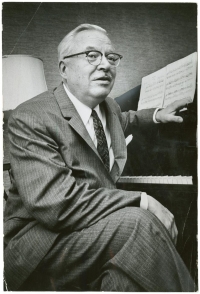
Heinz Roemheld (May 1, 1901 – February 11, 1985) was an American composer.Born Heinz Eric Roemheld in Milwaukee, Wisconsin, he was one of four children of German immigrant Heinrich Roemheld and his wife Fanny Rauterberg Roemheld. Heinrich was a pharmacist, but all the members of the family were musical. Heinz's brother Edgar (1898-1964) became a conductor, while sister Irmgard (1904-1995) became a well-known Milwaukee music teacher and radio broadcaster.
Sonny Rollins
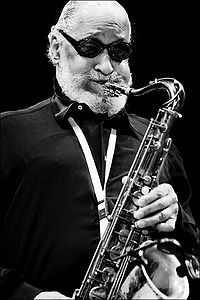
Theodore Walter Sonny" Rollins, American jazz tenor saxophonist. It is considered one of the living jazz legends. Many of his compositions, "St. Thomas", "Oleo", "Doxy", and "Airegin", are among the jazz standards.
Liszt

Franz Liszt (October 22, 1811 – July 31, 1886) was a Hungarian composer, virtuoso pianist and teacher.
Liszt became renowned throughout Europe for his great skill as a performer; to this day, many consider him to have been the greatest pianist in history. He was also an important and influential composer, a notable piano teacher, a conductor who contributed significantly to the modern development of the art, and a benefactor to other composers and performers, notably Richard Wagner and Hector Berlioz.
As a composer, Liszt was one of the most prominent representatives of the "Neudeutsche Schule" ("New German School"). He left behind a huge and diverse oeuvre, in which he influenced his forward-looking contemporaries and anticipated some 20th-century ideas and trends. Some of his most notable contributions were the invention of the symphonic poem, developing the concept of thematic transformation as part of his experiments in musical form and making radical departures in harmony.
Liszt has most frequently been credited to have been the first pianist who gave concerts with programs consisting only of solo pieces. An example is a concert he gave on March 9, 1839, at the Palazzo Poli in Rome. Since Liszt could not find singers who — following the usual habit of the time — should have completed the program, he played four numbers all alone.
Liszt was a prolific composer. Most of his music is for the piano and much of it requires formidable technique.In his most famous and virtuosic works, he is the archetypal Romantic composer. Liszt pioneered the technique of thematic transformation, a method of development which was related to both the existing variation technique and to the new use of the Leitmotif by Richard Wagner. Liszt's piano works are usually divided into two classes. On the one hand, there are "original works", and on the other hand "transcriptions", "paraphrases" or "fantasies" on works by other composers.
Liszt became renowned throughout Europe for his great skill as a performer; to this day, many consider him to have been the greatest pianist in history. He was also an important and influential composer, a notable piano teacher, a conductor who contributed significantly to the modern development of the art, and a benefactor to other composers and performers, notably Richard Wagner and Hector Berlioz.
As a composer, Liszt was one of the most prominent representatives of the "Neudeutsche Schule" ("New German School"). He left behind a huge and diverse oeuvre, in which he influenced his forward-looking contemporaries and anticipated some 20th-century ideas and trends. Some of his most notable contributions were the invention of the symphonic poem, developing the concept of thematic transformation as part of his experiments in musical form and making radical departures in harmony.
Liszt has most frequently been credited to have been the first pianist who gave concerts with programs consisting only of solo pieces. An example is a concert he gave on March 9, 1839, at the Palazzo Poli in Rome. Since Liszt could not find singers who — following the usual habit of the time — should have completed the program, he played four numbers all alone.
Liszt was a prolific composer. Most of his music is for the piano and much of it requires formidable technique.In his most famous and virtuosic works, he is the archetypal Romantic composer. Liszt pioneered the technique of thematic transformation, a method of development which was related to both the existing variation technique and to the new use of the Leitmotif by Richard Wagner. Liszt's piano works are usually divided into two classes. On the one hand, there are "original works", and on the other hand "transcriptions", "paraphrases" or "fantasies" on works by other composers.
Adrián A. Cuello Piraquibis

Adrián Antonio Cuello Piraquibis was born on July 8, 1975 in Barranquilla (Colombia). He inherits his love of music from his parents. His mother, Francismir Piraquibis Belmont (rest assured) was a very happy woman who liked singing very much. His father, José Cuello Avendaño, a great lover of classical music, introduced him to love her.It was not until 1991, when he entered the Corazonista Seminary in Marinilla (Antioquia) that he received from the brothers the first notions of music theory, guitar and recorder. From that time he remembers with pleasure the Brothers Agustín Navarro, Miguel Viana and Jorge Escaff.
She Loves Me
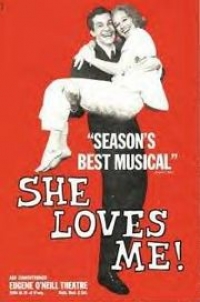
She Loves Me is a musical with a book by Joe Masteroff, lyrics by Sheldon Harnick, and music by Jerry Bock.The musical is the third adaptation of the 1937 play Parfumerie by Hungarian playwright Miklós László, following the 1940 James Stewart-Margaret Sullavan film The Shop Around the Corner and the 1949 Judy Garland-Van Johnson musical version In the Good Old Summertime. It surfaced again in 1998 as the Tom Hanks-Meg Ryan feature You've Got Mail. The plot revolves around Budapest shop employees Georg Nowack and Amalia Balash who, despite being consistently at odds with each other at work, are unaware that each is the other's secret pen pal met through lonely-hearts ads.
Hangad Music Ministry

Hangád (Tagalog: "yearning" or "desire") is an inspirational vocal ensemble known for songs like Pananatili, Pagkakaibigan, and Panunumpâ (covered by pop singer Carol Banawa). They have also recorded albums which are co-produced with the Jesuit Music Ministry (JMM), the musical arm of Jesuit Communications Foundation (JesCom) of the Philippine Province of the Society of Jesus.
In 2006, Hangad won an Awit Award for Best Inspirational or Religious Song.[1
In 2006, Hangad won an Awit Award for Best Inspirational or Religious Song.[1
Muse

Muse are a British rock band formed in Teignmouth, Devon, United Kingdom in 1994 under the alias of Rocket Baby Dolls. The band comprises Matthew Bellamy (vocals, guitar and piano), Christopher Wolstenholme (bass guitar and backing vocals) and Dominic Howard (drums and percussion). Muse's style can be considered as a mixture of many musical genres, most notably alternative rock, classical music and electronica. Muse are known best for their energetic and visually dazzling live performances and on June 16th & 17th, 2007 became the first band to sell out the newly built Wembley Stadium in London. Muse have released four studio albums with their first, Showbiz, released in 1999, followed by Origin of Symmetry in 2001 and Absolution in 2003. The most recent, Black Holes & Revelations (2006), was also the most critically acclaimed, garnering the band a Mercury Prize nomination and a third place finish in the NME Albums of the Year list for 2006. Muse have won various awards throughout their career including 5 MTV Europe Music Awards, 5 Q Awards, 4 NME Awards and 2 Brit awards.
Hiromi Uehara

Hiromi Uehara (上原ひろみ, born 26 March 1979), known as Hiromi, is a jazz composer and pianist born in Hamamatsu, Japan. She is known for her virtuosic technique, energetic live performances and blend of musical genres such as post-bop, progressive rock, classical and fusion in her compositions.
Johann Strauss

Johann Strauss I (March 14, 1804 – September 25, 1849; German: Johann Baptist Strauß, Johann Strauss (Vater); also Johann Baptist Strauss, Johann Strauss, Sr., the Elder, the Father), born in Vienna, was an Austrian Romantic composer famous for his waltzes, and for popularizing them alongside Joseph Lanner, thereby setting the foundations for his sons to carry on his musical dynasty. His most famous piece is probably the Radetzky March (named after Joseph Radetzky von Radetz), while his most famous waltz is probably the Lorelei Rheinklänge, Op. 154.
Reynaldo Hahn

Reynaldo Hahn (Spanish pronunciation: ; 9 August 1874 – 28 January 1947) was a Venezuelan-born French composer, conductor, music critic, and singer. He is best known for his songs – mélodies – of which he wrote more than 100.
Hahn was born in Caracas but his family moved to Paris when he was a child, and he lived most of his life there. Following the success of his song "Si mes vers avaient des ailes" (If my verses had wings), written when he was aged 14, he became a prominent member of fin de siècle French society.
Hahn was born in Caracas but his family moved to Paris when he was a child, and he lived most of his life there. Following the success of his song "Si mes vers avaient des ailes" (If my verses had wings), written when he was aged 14, he became a prominent member of fin de siècle French society.
Aqua timez

Aqua timezFutoshi and OKP-Star met on with9.com in 2000 and attempted to start a band together. Unable to agree on the band's future, the two disbanded. In 2003, the current band members gathered and formed Aqua Timez. Their first independent music mini album, Sora Ippai ni Kanaderu Inori, was released in August 2005.[3
Southwind Drum and Bugle Corps

Southwind Drum and Bugle Corps is an Open Class competitive junior drum and bugle corps based in Mobile, Alabama. The corps was a Division I competitive junior drum and bugle corps in Drum Corps International from 1993 through 2007.
Maceo Parker
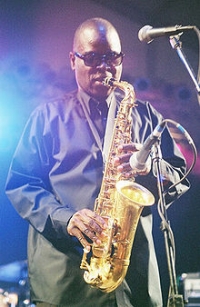
Maceo Parker (born February 14, 1943) is an American funk and soul jazz saxophonist, best known for his work with James Brown in the 1960s, as well as Parliament-Funkadelic in the 1970s. Parker was a prominent soloist on many of Brown's hit recordings, and a key part of his band, playing alto, tenor and baritone saxophones. He is now just as well known for his own shows, as he has toured continuously under his own name since the early 1990s and has built up a strong fan base.
Linda Lapp

Linda Lapp Canadian folk musician based in Victoria, British Columbia
George Baker
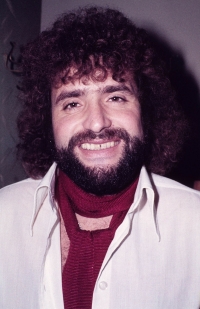
George Baker is a Dutch singer and songwriter who, with his band George Baker Selection, scored two international hits in the 1970s, "Paloma Blanca" and "Little Green Bag." He became a solo artist after 1989. "Little Green Bag" was used as the opening soundtrack for the film Reservoir Dogs.
Katy Perry

Katy Perry (born Katheryn Elizabeth Hudson; October 25, 1984) is an American singer-songwriter. She has risen to prominence with her 2008 single "I Kissed a Girl" which has become a worldwide hit topping the charts in more than 20 countries, including United Kingdom, Canada, Australia, Ireland, and the United States, where it was the 1000th Billboard Hot 100 number 1. Perry has stated in the press that it's thanks to successful British singer-songwriters Amy Winehouse and Lily Allen that more female artists had been appearing on the charts. She went on to say that Winehouse and Allen "have introduced America to great music". She is known for her unconventional style of dress, often humoristic, bright in color and reminiscent of different decades, as well as her frequent use of fruit-shaped accessories, mainly watermelon as part of her outfits. Perry has a contralto vocal range.
Jeanine Tesori

Jeanine Tesori is an American composer and musical arranger. She is the most prolific and honored female theatrical composer in history, with five Broadway musicals and five Tony Award nominations.
George Gershwin

George Gershwin (September 26, 1898 – July 11, 1937) was an American composer. He wrote most of his vocal and theatrical works in collaboration with his elder brother, lyricist Ira Gershwin. George Gershwin composed songs both for Broadway and for the classical concert hall. He also wrote popular songs with success.
Many of his compositions have been used on television and in numerous films, and many became jazz standards. The jazz singer Ella Fitzgerald recorded many of the Gershwins' songs on her 1959 Gershwin Songbook (arranged by Nelson Riddle). Countless singers and musicians have recorded Gershwin songs, including Fred Astaire, Louis Armstrong, Al Jolson, Bobby Darin, Art Tatum, Bing Crosby, Janis Joplin, John Coltrane, Frank Sinatra, Billie Holiday, Sam Cooke, Miles Davis, Herbie Hancock, Madonna, Judy Garland, Julie Andrews, Barbra Streisand, Marni Nixon, Natalie Cole, Patti Austin, Nina Simone, Maureen McGovern, John Fahey, The Residents, Than & Sam, Sublime, and Sting. A residential building is named after him on the Stony Brook University campus.
Many of his compositions have been used on television and in numerous films, and many became jazz standards. The jazz singer Ella Fitzgerald recorded many of the Gershwins' songs on her 1959 Gershwin Songbook (arranged by Nelson Riddle). Countless singers and musicians have recorded Gershwin songs, including Fred Astaire, Louis Armstrong, Al Jolson, Bobby Darin, Art Tatum, Bing Crosby, Janis Joplin, John Coltrane, Frank Sinatra, Billie Holiday, Sam Cooke, Miles Davis, Herbie Hancock, Madonna, Judy Garland, Julie Andrews, Barbra Streisand, Marni Nixon, Natalie Cole, Patti Austin, Nina Simone, Maureen McGovern, John Fahey, The Residents, Than & Sam, Sublime, and Sting. A residential building is named after him on the Stony Brook University campus.
Mika

Mica Penniman (born 18 August 1983), known as Mika, is a Lebanese-born, London-based, Grammy-nominated and BRIT Award-winning singer-songwriter, who has a recording contract with Casablanca Records and Universal Music. He rose to fame around the end of 2006 and the start of 2007. His birth name is Michael Holbrook Penniman.
Laurens van rooyen

Laurens van Rooyen (Utrecht, 27 March 1935) is a Dutch pianist and composer. He is known for his cooperation in the theater with Herman van Veen. He composed many pieces for the piano and wrote the score for several Dutch films. He wrote two books on his experiences as a musician.
The Cavaliers Drum and Bugle Corps

The Cavaliers Drum and Bugle Corps (also known as "The Green Machine") is a World Class competitive junior drum and bugle corps. Based in Rosemont, Illinois, The Cavaliers were one of the thirteen founding member corps of Drum Corps International and is a seven-time DCI World Champion. The Cavaliers are now the sole remaining all-male corps in an activity that once was predominantly made up of "all boy" groups.
Benedetto Marcello
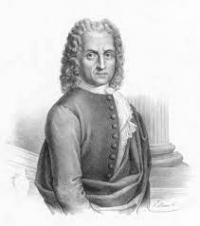
Benedetto Giacomo Marcello (Italian: ; 31 July or 1 August 1686 – 24 July 1739) was an Italian composer, writer, advocate, magistrate, and teacher in Venice, Benedetto Marcello was a member of a noble family and in his compositions he is frequently referred to anonymously as Patrizio Veneto (A Noble of Venice). Although he was a music student of Antonio Lotti and Francesco Gasparini, his father wanted Benedetto to devote himself to law. Benedetto managed to combine a life in law and public service with one in music.
Daniel E. Kelley

Daniel E. Kelley was a musician and entertainer, who after moving to Kansas in 1872, wrote the music for "Home on the Range", which became the state song. Kelley played violin with his brothers-in-law in the Harlan Brothers Band, but was primarily a carpenter by trade.
Bach

Johann Sebastian Bach (31 March 1685 – 28 July 1750) was a German composer and organist whose sacred and secular works for choir, orchestra, and solo instruments drew together the strands of the Baroque period and brought it to its ultimate maturity. Although he introduced no new forms, he enriched the prevailing German style with a robust contrapuntal technique, an unrivalled control of harmonic and motivic organisation in composition for diverse musical forces, and the adaptation of rhythms and textures from abroad, particularly Italy and France.
Revered for their intellectual depth and technical and artistic beauty, Bach's works include the Brandenburg concertos; the Goldberg Variations; the English Suites, French Suites, Partitas, and Well-Tempered Clavier; the Mass in B Minor; the St. Matthew Passion; the St. John Passion; The Musical Offering; The Art of Fugue; the Sonatas and Partitas for violin solo; the Cello Suites; more than 200 surviving cantatas; and a similar number of organ works, including the celebrated Toccata and Fugue in D Minor.
While Bach's fame as an organist was great during his lifetime, he was not particularly well-known as a composer. His adherence to Baroque forms and contrapuntal style was considered "old-fashioned" by his contemporaries, especially late in his career when the musical fashion tended towards Rococo and later Classical styles. A revival of interest and performances of his music began early in the 19th century, and he is now widely considered to be one of the greatest composers in the Western tradition.
Revered for their intellectual depth and technical and artistic beauty, Bach's works include the Brandenburg concertos; the Goldberg Variations; the English Suites, French Suites, Partitas, and Well-Tempered Clavier; the Mass in B Minor; the St. Matthew Passion; the St. John Passion; The Musical Offering; The Art of Fugue; the Sonatas and Partitas for violin solo; the Cello Suites; more than 200 surviving cantatas; and a similar number of organ works, including the celebrated Toccata and Fugue in D Minor.
While Bach's fame as an organist was great during his lifetime, he was not particularly well-known as a composer. His adherence to Baroque forms and contrapuntal style was considered "old-fashioned" by his contemporaries, especially late in his career when the musical fashion tended towards Rococo and later Classical styles. A revival of interest and performances of his music began early in the 19th century, and he is now widely considered to be one of the greatest composers in the Western tradition.
Vivaldi

Antonio Lucio Vivaldi (March 4, 1678 â July 28, 1741), nicknamed il Prete Rosso ("The Red Priest"), was a Venetian priest and Baroque music composer, as well as a famous virtuoso violinist; he was born and raised in the Republic of Venice. The Four Seasons, a series of four violin concerti, is his best-known work and a highly popular Baroque piece.
Many of Vivaldi's compositions reflect a flamboyant, almost playful, exuberance. Most of Vivaldi's repertoire was rediscovered only in the first half of the 20th century in Turin and Genoa and was published in the second half. Vivaldi's music is innovative, breaking a consolidated tradition in schemes; he gave brightness to the formal and the rhythmic structure of the concerto, repeatedly looking for harmonic contrasts and innovative melodies and themes. Moreover, Vivaldi was able to compose nonacademic music, particularly meant to be appreciated by the wide public and not only by an intellectual minority. The joyful appearance of his music reveals in this regard a transmissible joy of composing; these are among the causes of the vast popularity of his music. This popularity soon made him famous in other countries such as France which was, at the time, very independent concerning its musical taste.
Vivaldi is considered one of the composers who brought Baroque music (with its typical contrast among heavy sonorities) to evolve into a classical style. Johann Sebastian Bach was deeply influenced by Vivaldi's concertos and arias (recalled in his Johannes Passion, Matthäuspassion, and cantatas). Bach transcribed a number of Vivaldi's concerti for solo keyboard, along with a number for orchestra, including the famous Concerto for Four Violins and Violoncello, Strings and Continuo (RV 580).
Many of Vivaldi's compositions reflect a flamboyant, almost playful, exuberance. Most of Vivaldi's repertoire was rediscovered only in the first half of the 20th century in Turin and Genoa and was published in the second half. Vivaldi's music is innovative, breaking a consolidated tradition in schemes; he gave brightness to the formal and the rhythmic structure of the concerto, repeatedly looking for harmonic contrasts and innovative melodies and themes. Moreover, Vivaldi was able to compose nonacademic music, particularly meant to be appreciated by the wide public and not only by an intellectual minority. The joyful appearance of his music reveals in this regard a transmissible joy of composing; these are among the causes of the vast popularity of his music. This popularity soon made him famous in other countries such as France which was, at the time, very independent concerning its musical taste.
Vivaldi is considered one of the composers who brought Baroque music (with its typical contrast among heavy sonorities) to evolve into a classical style. Johann Sebastian Bach was deeply influenced by Vivaldi's concertos and arias (recalled in his Johannes Passion, Matthäuspassion, and cantatas). Bach transcribed a number of Vivaldi's concerti for solo keyboard, along with a number for orchestra, including the famous Concerto for Four Violins and Violoncello, Strings and Continuo (RV 580).
Simon & Garfunkel
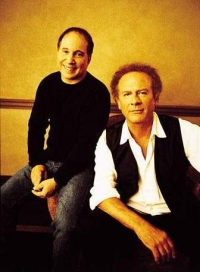
Simon & Garfunkel are an American singer-songwriter duo of Paul Simon and Art Garfunkel. They formed the group Tom and Jerry in 1957, and had their first taste of success with the minor hit "Hey, Schoolgirl". As Simon and Garfunkel, the duo rose to fame in 1965, backed by the hit single "The Sounds of Silence". Their music was featured in the landmark film The Graduate, propelling them further into the public consciousness.
They are well known for their close harmonies and sometimes unstable relationship. Their last album, Bridge over Troubled Water, was delayed several times due to artistic disagreements. They were among the most popular recording artists of the 1960s, and are perhaps best known for their songs "The Sounds of Silence", "Mrs. Robinson", "Bridge over Troubled Water", and "The Boxer". They have received several Grammys and are inductees of the Rock and Roll Hall of Fame and the Long Island Music Hall of Fame (2007). In 2004, Rolling Stone ranked Simon and Garfunkel #40 on their list of the 100 Greatest Artists of All Time.
They have reunited on several occasions since their 1970 breakup, most famously for 1981's The Concert in Central Park, which attracted more than 500,000 people.
They are well known for their close harmonies and sometimes unstable relationship. Their last album, Bridge over Troubled Water, was delayed several times due to artistic disagreements. They were among the most popular recording artists of the 1960s, and are perhaps best known for their songs "The Sounds of Silence", "Mrs. Robinson", "Bridge over Troubled Water", and "The Boxer". They have received several Grammys and are inductees of the Rock and Roll Hall of Fame and the Long Island Music Hall of Fame (2007). In 2004, Rolling Stone ranked Simon and Garfunkel #40 on their list of the 100 Greatest Artists of All Time.
They have reunited on several occasions since their 1970 breakup, most famously for 1981's The Concert in Central Park, which attracted more than 500,000 people.
Dave Brubeck
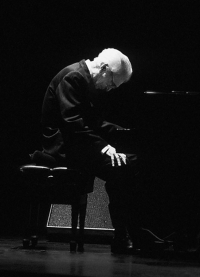
David Warren Brubeck (born December 6, 1920 in Concord, California), better known as Dave Brubeck, is an American jazz pianist. Regarded as a genius in his field, he has written a number of jazz standards, including "In Your Own Sweet Way" and "The Duke". Brubeck's style ranges from refined to bombastic, reflecting his mother's attempts at classical training and his improvisational skills. Much of his music employs unusual time signatures.
His long-time musical partner, alto saxophonist Paul Desmond, wrote the Dave Brubeck Quartet's most famous piece, "Take Five", which is in 5/4 time and has endured as a jazz classic. Brubeck experimented with time signatures through much of his career, recording "Pick Up Sticks" in 6/4, "Unsquare Dance" in 7/4, and "Blue Rondo à la Turk" in 9/8. He also provided music for the TV animated miniseries "This Is America, Charlie Brown".
His long-time musical partner, alto saxophonist Paul Desmond, wrote the Dave Brubeck Quartet's most famous piece, "Take Five", which is in 5/4 time and has endured as a jazz classic. Brubeck experimented with time signatures through much of his career, recording "Pick Up Sticks" in 6/4, "Unsquare Dance" in 7/4, and "Blue Rondo à la Turk" in 9/8. He also provided music for the TV animated miniseries "This Is America, Charlie Brown".
Within Temptation

Within Temptation is a Dutch rock/metal band. The band was founded in 1996 by vocalist Sharon den Adel and guitarist Robert Westerholt. Their music is described as symphonic metal, gothic metal, although in an interview, Den Adel said they fell into a symphonic rock genre with various influences, and in a later interview with 3VOOR12, Sharon stated that "we consider ourselves more a symphonic rock band ... we are in my opinion no gothic band".
After the release of their first album Enter, the band became prominent in the underground scene. However it was not until 2001 that they became known to the general public, with the single "Ice Queen" from the album Mother Earth, which reached #2 on the charts. Since then, the band won the Conamus Exportprijs five years in a row. Their next album The Silent Force debuted at #1 on the Dutch charts, as did their latest, The Heart of Everything. In 2008 they released a live DVD and CD, Black Symphony, recorded with the Metropole Orchestra.
On August 11, 2009 Within Temptation announced that they would be releasing a live album consisting of acoustic sets from their theatre tour, entitled An Acoustic Night At The Theatre, which was released on October 30th.
After the release of their first album Enter, the band became prominent in the underground scene. However it was not until 2001 that they became known to the general public, with the single "Ice Queen" from the album Mother Earth, which reached #2 on the charts. Since then, the band won the Conamus Exportprijs five years in a row. Their next album The Silent Force debuted at #1 on the Dutch charts, as did their latest, The Heart of Everything. In 2008 they released a live DVD and CD, Black Symphony, recorded with the Metropole Orchestra.
On August 11, 2009 Within Temptation announced that they would be releasing a live album consisting of acoustic sets from their theatre tour, entitled An Acoustic Night At The Theatre, which was released on October 30th.
Fiona Apple

Fiona Apple (born Fiona Apple McAfee Maggart on September 13, 1977) is a Grammy-winning American singer-songwriter. She gained popularity through her 1996 album Tidal, especially with the single "Criminal", and because of the music video made for it. Her music is fundamentally based on very personal poetic verses, accompanied by often aggressive and progressive production, rooted equally in early jazz, pop, and alt-rock. A supporter of People for the Ethical Treatment of Animals (PETA), Apple is a vegan.
Carl Bohm

Carl Bohm (also known as Henry Cooper and Karl Bohm) (11 September 1844 – 4 April 1920) was a German pianist and composer.Bohm is regarded as one of the leading German songwriters of the 19th century, and wrote such works as Still as the Night, Twilight, May Bells, Enfant Cheri and The Fountain.The Oxford Companion to Music says that Bohm was "a German composer of great fecundity and the highest salability... He occupied an important position in the musical commonwealth inasmuch as his publisher, N. Simrock, declared that the profits on his compositions provided the capital for the publication of those of Brahms.
J. S. Bach
Johann Sebastian Bach (21 March 1685, O.S.31 March 1685, N.S. – 28 July 1750, N.S.) was a German composer, organist, harpsichordist, violist, and violinist whose sacred and secular works for choir, orchestra, and solo instruments drew together the strands of the Baroque period and brought it to its ultimate maturity. Although he did not introduce new forms, he enriched the prevailing German style with a robust contrapuntal technique, an unrivalled control of harmonic and motivic organisation, and the adaptation of rhythms, forms and textures from abroad, particularly from Italy and France.
Revered for their intellectual depth, technical command and artistic beauty, Bach's works include the Brandenburg Concertos, the Goldberg Variations, the Partitas, The Well-Tempered Clavier, the Mass in B minor, the St Matthew Passion, the St John Passion, the Magnificat, A Musical Offering, The Art of Fugue, the English and French Suites, the Sonatas and Partitas for solo violin, the Cello Suites, more than 200 surviving cantatas, and a similar number of organ works, including the famous Toccata and Fugue in D minor and Passacaglia and Fugue in C minor, as well as the Great Eighteen Chorale Preludes and Organ Mass.
Bach's abilities as an organist were highly respected throughout Europe during his lifetime, although he was not widely recognised as a great composer until a revival of interest and performances of his music in the first half of the 19th century. He is now generally regarded as one of the main composers of the Baroque style, and as one of the greatest composers of all time.
Revered for their intellectual depth, technical command and artistic beauty, Bach's works include the Brandenburg Concertos, the Goldberg Variations, the Partitas, The Well-Tempered Clavier, the Mass in B minor, the St Matthew Passion, the St John Passion, the Magnificat, A Musical Offering, The Art of Fugue, the English and French Suites, the Sonatas and Partitas for solo violin, the Cello Suites, more than 200 surviving cantatas, and a similar number of organ works, including the famous Toccata and Fugue in D minor and Passacaglia and Fugue in C minor, as well as the Great Eighteen Chorale Preludes and Organ Mass.
Bach's abilities as an organist were highly respected throughout Europe during his lifetime, although he was not widely recognised as a great composer until a revival of interest and performances of his music in the first half of the 19th century. He is now generally regarded as one of the main composers of the Baroque style, and as one of the greatest composers of all time.
Chris DeGarmo
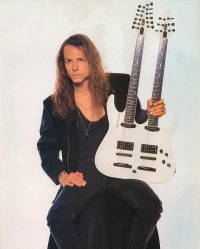
Christopher Lee DeGarmo is an American guitarist and songwriter, best known for being a lead and rhythm guitarist, backing vocalist, and primary songwriter in the progressive metal band Queensrÿche from their formation in 1980 until 1998, and with whom he played during their most commercially successful period.
Ernst Haberbier
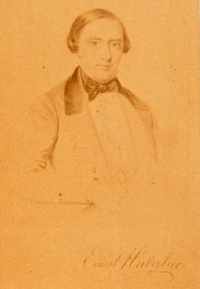
Ernst Haberbier (5 October 1813 – 12 March 1869) was a German composer, pianist and music teacher.Ernst Haberbier was born in 1813 in Königsberg. He studied the piano with his father who was an organist. When he was nineteen he left Königsberg and moved to Saint Petersburg. There he became famous as a concert pianist and as a teacher. He became the Imperial Court Pianist in 1847. Around 1850 he moved to Christiania to work on his technique. He gave concerts around Europe until 1866. Then he moved to Bergen and became a teacher. He died 1869 while he was playing a concert. As a composer, Haberbier was best known for his piano music. Two sets of pieces called Études-Poésies (Op 53 and Op 59) were very popular. They are still sometimes played today.
James Bond Theme Song (banda sinfonica)

James Bond 007 is an imaginary British agent character created by Ian Fleming in 1952. Until his death in 1964, Fleming wrote several novels and small stories around this character.
Enrique Granados
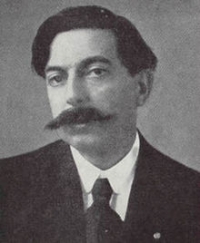
Enrique Granados y Campiña (27 July 1867 – 24 March 1916) was a Spanish Catalan pianist and composer of classical music. His music is in a uniquely Spanish style and, as such, representative of musical nationalism. Enrique Granados was also a talented painter in the style of Francisco Goya.
Granados wrote piano music, chamber music (a piano quintet, a piano trio, music for violin and piano), songs, zarzuelas, and an orchestral tone poem based on Dante's Divine Comedy. Many of his piano compositions have been transcribed for the classical guitar: examples include Dedicatoria, Danza No. 5, Goyescas.
Granados was an important influence on at least two other important Spanish composers and musicians, Manuel de Falla and Pablo Casals. He was also the teacher of composer Rosa García Ascot.
Granados wrote piano music, chamber music (a piano quintet, a piano trio, music for violin and piano), songs, zarzuelas, and an orchestral tone poem based on Dante's Divine Comedy. Many of his piano compositions have been transcribed for the classical guitar: examples include Dedicatoria, Danza No. 5, Goyescas.
Granados was an important influence on at least two other important Spanish composers and musicians, Manuel de Falla and Pablo Casals. He was also the teacher of composer Rosa García Ascot.
Gabriel Faure

Gabriel Urbain Fauré (12 May 1845 – 4 November 1924) was a French composer, organist, pianist, and teacher. He was the foremost French composer of his generation, and his musical style influenced many 20th century composers. His harmonic and melodic language affected how harmony was later taught.
Athur Laurent

Arthur Laurents (July 14, 1917 – May 5, 2011) was an American playwright, stage director and screenwriter.
After writing scripts for radio shows after college and then training films for the U.S. Army during World War II, Laurents turned to writing for Broadway, producing a body of work that includes West Side Story (1957), Gypsy (1959), and Hallelujah, Baby! (1967), and directing some of his own shows and other Broadway productions.
His early film scripts include Rope (1948) for Alfred Hitchcock, followed by Anastasia (1956), Bonjour Tristesse (1958), The Way We Were (1973), and The Turning Point (1977).
Contents
1 Early life
2 Theatrical career
3 Film career
4 Blacklist
5 Memoirs
6 Death
7 Work
7.1 Writing
7.2 Directing
7.3 Additional credits
8 Awards, nominations and honors
9 See also
10 References
11 Further reading
12 External links
Early life
Born Arthur Levine, Laurents was the son of middle-class Jewish parents, a lawyer and a schoolteacher who gave up her career when she married. He was born and raised in the Flatbush section of Brooklyn, a borough of New York City, New York, the elder of two children, and attended Erasmus Hall High School. His sister Edith suffered from chorea as a child.
His paternal grandparents were Orthodox Jews, and his mother's parents, although born Jewish, were atheists. His mother kept a kosher home for her husband's sake, but was lax about attending synagogue and observing the Jewish holidays. His Bar Mitzvah marked the end of Laurents's religious education and the beginning of his rejection of all fundamentalist religions, although he continued to identify himself as Jewish. However, late in life he admitted to having changed his last name from Levine to the less Jewish-sounding Laurents, "to get a job."
After graduating from Cornell University, Laurents took an evening class in radio writing at New York University. William N. Robson, his instructor, a CBS Radio director/producer, submitted his script Now Playing Tomorrow, a comedic fantasy about clairvoyance, to the network, and it was produced in the Columbia Workshop series on January 30, 1939, with Shirley Booth in the lead role. It was Laurents' first professional credit. The show's success led to him being hired to write scripts for various radio shows, among them Lux Radio Theater. Laurents' career was interrupted when he was drafted into the U.S. Army in the middle of World War II. Through a series of clerical errors, he never saw battle, but instead was assigned to the U.S. Army Pictorial Service located in a film studio in Astoria, Queens, where he wrote training films and met, among others, George Cukor and William Holden. He later was reassigned to write plays for Armed Service Force Presents, a radio show that dramatized the contributions of all branches of the armed forces.
Theatrical career
According to John Clum, "Laurents was always a mirror of his times. Through his best work, one sees a staged history of leftist, gender, and gay politics in the decades after World War II." After graduating from Cornell University in 1937, Laurents went to work as a writer for radio drama at CBS in New York. His military duties during World War II, which consisted of writing training films and radio scripts for Armed Service Force Presents, brought him into contact with some of the best film directors—distinguished director George Cukor directed his first script. Laurents's work in radio and film during World War II was an excellent apprenticeship for a budding playwright and screenwriter. He also had the good fortune to be based in New York City. His first stage play, Home of the Brave, was produced in 1945. The sale of the play to a film studio gave Laurents the entrée he needed to become a Hollywood screenwriter though he continued, with mixed success, to write plays. The most important of his early screenplays is his adaptation of Rope for Alfred Hitchcock.
Soon after being discharged from the Army, Laurents met ballerina Nora Kaye, and the two became involved in an on-again, off-again romantic relationship. While Kaye was on tour with Fancy Free, Laurents continued to write for the radio but was becoming discontented with the medium. At the urging of Martin Gabel, he spent nine consecutive nights writing a play In 1962, Laurents directed I Can Get It for You Wholesale, which helped to turn then-unknown Barbra Streisand into a star. His next project was the stage musical Anyone Can Whistle, which he directed and for which he wrote the book, but it proved to be an infamous flop. He later had success with the musicals Hallelujah, Baby! (written for Lena Horne but ultimately starring Leslie Uggams) and La Cage Aux Folles (1983), which he directed, however Nick & Nora was not successful.
In 2008, Laurents directed a Broadway revival of Gypsy starring Patti LuPone, and in 2009, he tackled a bilingual revival of West Side Story, with Spanish translations of some dialogue and lyrics by Lin-Manuel Miranda. While preparing West Side Story, he noted, "The musical theatre and cultural conventions of 1957 made it next to impossible for the characters to have authenticity." Following the production's March 19 opening at the Palace Theatre, Ben Brantley of The New York Times called the translations "an only partly successful experiment" and added, "Mr. Laurents has exchanged insolence for innocence and, as with most such bargains, there are dividends and losses." The national tour (2011-2012) was directed by David Saint, who was Laurents' assistant director on the Broadway production. The Spanish lyrics and dialog were reduced from about 18% of the total to about 10%.
Film career
Laurents' first Hollywood experience proved to be a frustrating disappointment. Director Anatole Litvak, unhappy with the script submitted by Frank Partos and Millen Brand for The Snake Pit (1948), hired Laurents to rewrite it. Partos and Brand later insisted the bulk of the shooting script was theirs, and produced carbon copies of many of the pages Laurents actually had written to bolster their claim. Having destroyed the original script and all his notes and rewritten pages after completing the project, Laurents had no way to prove most of the work was his, and the Writers Guild of America denied him screen credit. Brand later confessed he and Partos had copied scenes written by Laurents and apologized for his role in the deception. Four decades later, Laurents learned he was ineligible for WGA health benefits because he had failed to accumulate enough credits to qualify. He was short by one, the one he failed to get for The Snake Pit.
Upon hearing 20th Century Fox executives were pleased with Laurents' work on The Snake Pit, Alfred Hitchcock hired him for his next project, the film Rope starring James Stewart. Hitchcock wanted Laurents to Americanize the British play Rope (1929) by Patrick Hamilton for the screen. With his then-lover Farley Granger set to star, Laurents was happy to accept the assignment. His dilemma was how to make the audience aware of the fact the three main characters were homosexual without blatantly saying so. The Hays Office kept close tabs on his work, and the final script was so discreet that Laurents was unsure whether co-star James Stewart ever realized that his character was gay. In later years, Hitchcock asked him to script both Torn Curtain (1966) and Topaz (1969), However, Laurents, in both cases unenthused by the material, declined the offers.
Laurents also scripted Anastasia (1956) and Bonjour Tristesse (1958). The Way We Were (1973), in which he incorporated many of his own experiences, particularly those with the HUAC, reunited him with Barbra Streisand, and The Turning Point (1977), inspired in part by his love for Nora Kaye, was directed by her husband Herbert Ross. The Fox animated feature film Anastasia (1997) was based in part from his screenplay of the live-action 1956 film of the same title.
Blacklist
Because of a casual remark made by Russel Crouse, Laurents was called to Washington, D.C., to account for his political views. He explained himself to the House Un-American Activities Committee, and his appearance had no obvious impact on his career, which at the time was primarily in the theatre. When the McCarran Internal Security Act, which prohibited individuals suspected of engaging in subversive activities from obtaining a passport, was passed in 1950, Laurents and Granger immediately applied for and received passports and departed for Paris with Harold Clurman and his wife Stella Adler. Laurents and Granger remained abroad, traveling throughout Europe and northern Africa, for about 18 months.
Years earlier, Laurents and Jerome Robbins had developed Look Ma, I'm Dancin'! (1948), a stage musical about the world of ballet that ran for 188 performances on Broadway, and starred Nancy Walker and Harold Lang. (Although the musical was ultimately produced with a book by Jerome Lawrence and Robert E. Lee, as Laurents left the project.) Robbins approached Paramount Pictures about directing a screen version, and the studio agreed as long as Laurents was not part of the package.
It was not until then that Laurents learned he officially had been blacklisted, primarily because a review of Home of the Brave had been published in the Daily Worker. He decided to return to Paris, but the State Department refused to renew his passport. Laurents spent three months trying to clear his name, and after submitting a lengthy letter explaining his political beliefs in detail, it was determined they were so idiosyncratic he could not have been a member of any subversive groups. Within a week his passport was renewed, and the following day he sailed for Europe on the Ile de France. While on board, he received a cable from Metro-Goldwyn-Mayer offering him a screenwriting assignment. The blacklist had ended.
Memoirs
Laurents wrote Original Story By Arthur Laurents: A Memoir of Broadway and Hollywood, published in 2000. In it, he discusses his lengthy career and his many gay affairs and long-term relationships, including those with Farley Granger and Tom Hatcher (August 24, 1929 - October 26, 2006). Hatcher was an aspiring actor whom Gore Vidal suggested Laurents seek out at the Beverly Hills men's clothing store Hatcher was managing at the time. The couple remained together for 52 years until Hatcher's death on October 26, 2006.
Laurents wrote Mainly on Directing: Gypsy, West Side Story and Other Musicals, published in 2009, in which he discussed musicals he directed and the work of other directors he admired.
His last memoir titled The Rest of the Story was published posthumously in September 2012.
Death
Laurents died at the age of 93 at his home in Manhattan on May 5, 2011 of pneumonia complications, as reported by The New York Times. Following a long tradition, Broadway theatre lights were dimmed at 8 p.m. on May 6, 2011, for one minute in his memory. His ashes were buried alongside those of Tom Hatcher in a memorial bench in Quogue, Long Island, New York.
Work
Writing
Musicals
West Side Story – 1957 – Tony Nomination for Best Musical
Gypsy – 1959 – Tony Nomination for Best Musical
Anyone Can Whistle – 1964
Do I Hear a Waltz? – 1965
Hallelujah, Baby! – 1967 – Tony Award for Best Musical
The Madwoman of Central Park West – 1979
Nick & Nora – 1991
Novel
The Turning Point – 1977; New American Library (New York City); OCLC 11014907
Plays
Home of the Brave – 1945
The Bird Cage – 1950
The Time of the Cuckoo – 1952
A Clearing in the Woods – 1957
Invitation to a March – 1960
Directing
Invitation to a March – 1960
I Can Get It for You Wholesale – 1962
Anyone Can Whistle – 1964
Gypsy – 1974 – Tony Nomination for Best Direction of a Musical
The Madwoman of Central Park West – 1979
La Cage aux Folles – 1983 – Tony Award for Best Direction of a Musical
Nick & Nora – 1991
Gypsy – 2008 – Tony Award nomination as Best Director of a Musical
West Side Story – 2009 Broadway Revival
Additional credits
Anna Lucasta (screenwriter)
A Clearing in the Woods (playwright)
Invitation to a March (playwright, director)
The Madwoman of Central Park West (playwright, director)
My Good Name (playwright)
Jolson Sings Again (playwright)
The Enclave (playwright, director)
Radical Mystique (playwright, director)
Big Potato (playwright)
Two Lives (playwright)
My Good Name (playwright)
Claudia Lazlo (playwright)
Attacks on the Heart (playwright)
2 Lives (playwright)
New Year's Eve (playwright)
Come Back, Come Back, Wherever You Are (playwright, director)
Caught (screenwriter)
Rope (screenwriter)
Awards, nominations and honors
A new award was established in 2010, The Laurents/Hatcher Foundation Award. This is awarded annually "for an un-produced, full-length play of social relevance by an emerging American playwright." The Laurents/Hatcher Foundation will give $50,000 to the writer with a grant of $100,000 towards production costs at a nonprofit theatre. The first award will be given in 2011.
Theatre
1958 Tony Award for Best Musical (West Side Story, nominee)
1960 Tony Award for Best Musical (Gypsy, nominee)
1968 Tony Award for Best Musical (Hallelujah, Baby!, winner)
1975 Drama Desk Award for Outstanding Director of a Musical (Gypsy, winner)
1975 Tony Award for Best Direction of a Musical (Gypsy, nominee)
1984 Tony Award for Best Direction of a Musical (La Cage aux Folles, winner)
2008 Tony Award for Best Direction of a Musical (Gypsy, nominee)
Film
Academy Award for Best Picture (The Turning Point, nominee)
Academy Award for Best Original Screenplay (The Turning Point, nominee)
Edgar Allan Poe Award for Best Motion Picture Screenplay (Rope, nominee)
Golden Globe Award for Best Screenplay (The Turning Point, nominee)
Writers Guild of America Award for Best Original Screenplay (The Way We Were, nominee; The Turning Point, winner)
National Board of Review Award for Career Achievement (winner)
See also
Biography portal
Film portal
Musical Theatre portal
icon Theatre portal
icon Writing portal
List of Jewish American playwrights
List of novelists from the United States
List of pneumonia victims
List of people from Brooklyn, New York
List of playwrights from the United States
List of theatre directors
References
"Legendary Writer & Director Arthur Laurents Dies at 93". Broadway World. Retrieved May 6, 2011.
John M. Clum. The Works of Arthur Laurents: Politics, Love, and Betrayal. Amherst, NY: Cambria Press, 2014.
"Obituaries: Arthur Laurents". The Daily Telegraph. May 6, 2011.
"When You’re a Shark You’re a Shark All the Way". New York.
Hawtree, Christopher (May 6, 2011). "Arthur Laurents obituary: Playwright and screenwriter who wrote the book for West Side Story". The Guardian. Retrieved 6 August 2012.
Hutchinson, Bill (May 6, 2011). "Playwright Behind 'West Side Story' and 'Gypsy,' Arthur Laurents, Dies at Age 93". Daily News.
Arnold, Laurence (May 5, 2011). "Arthur Laurents, Writer of 'West Side Story,' 'Gypsy' Scripts, Dies at 93". Bloomberg News.
Laurents, Arthur. "Beginnings" Original Story By Arthur Laurents: A Memoir of Broadway and Hollywood, Hal Leonard Corporation, 2001, ISBN 1-55783-467-9, pp. 10–11, 34–35.
Laurents, Arthur. Original Story By. New York: Alfred A. Knopf (2000). ISBN 0-375-40055-9, pp. 6–7.
Laurents, p. 133.
Laurents, pp. 12–13.
Laurents, pp. 22–28.
Clum, John, "The Works of Arthur Laurents: Politics, Love, and Betrayal", November 2014, Cambria Press, ISBN 1604978848
Clum, John, "The Works of Arthur Laurents: Politics, Love, and Betrayal"
Laurents, p. 93.
Jones, Kenneth (July 16, 2008). "'West Side Story', This Time With Bilingual Approach, Will Return to Broadway in February 2009". Playbill.
Brantley, Ben (March 20, 2009). "Our Gangs". The New York Times.
Berson, M. (January 8, 2012). "'West Side Story': A classic revived" Archived January 12, 2012, at the Wayback Machine. Seattle Times.
Laurents, pp. 106–120.
Laurents, pp. 115–116, 124–131.
Laurents, p. 136.
""West Side Story Author Arthur Laurents Dies, 93" Archived July 9, 2012, at Archive.today forum.bcdb.com. May 4, 2011.
Laurents, p. 29.
Laurents, pp. 165–190.
Vaill, Amanda (2006). Somewhere: The Life of Jerome Robbins, Random House, Inc. p. 135. ISBN 0-7679-0420-6.
"'Look Ma, I'm Dancin' listing". Internet Broadway Database.
Laurents, pp. 286–289.
"Backstage.com obituary, November 1, 2006". Backstage.
Berkvist, Robert (May 5, 2011). "Arthur Laurents, Playwright and Director on Broadway, Dies at 93". The New York Times.
Jones, Kenneth (May 6, 2011). "Broadway Lights Will Dim May 6 in Memory of Arthur Laurents" Archived October 21, 2012, at the Wayback Machine. Playbill.
Gans, Andrew (June 3, 2010). "New Award Named for Arthur Laurents and His Partner, the Late Tom Hatcher" Archived June 5, 2010, at the Wayback Machine. Playbill.
Further reading
Laurents, Arthur (2000). Original Story by Arthur Laurents: A Memoir of Broadway and Hollywood. New York: Knopf. ISBN 0-375-40055-9.
Laurents, Arthur (2009). Mainly on Directing: Gypsy, West Side Story, and Other Musicals. New York: Knopf. ISBN 0-307-27088-2.
Clum, John (2014). The Works of Arthur Laurents: Politics, Love, and Betrayal. Amherst, NY: Cambria Press. ISBN 978-1-60497-884-1.
External links
Arthur Laurents at the Internet Broadway Database Edit this at Wikidata
Arthur Laurents at the Internet Off-Broadway Database
Arthur Laurents on IMDb
American Theatre Wing biography
Works by or about Arthur Laurents in libraries (WorldCat catalog)
Works by Arthur Laurents at Open Library Edit this at Wikidata
vte
Works by Arthur Laurents
Writer
Musicals
West Side Story (1957) Gypsy (1959) Anyone Can Whistle (1964) Do I Hear a Waltz? (1965) Hallelujah, Baby! (1967) The Madwoman of Central Park West (1979) Nick & Nora (1991)
Plays
Home of the Brave (1945) The Time of the Cuckoo (1952)
Films
Rope (1948) Caught (1949) Anastasia (1956) Bonjour Tristesse (1958) The Way We Were (1973) The Turning Point (1977)
Director
I Can Get It for You Wholesale (1962) Anyone Can Whistle (1964) Gypsy (1974) The Madwoman of Central Park West (1979) La Cage aux Folles (1983) Birds of Paradise (1987) Gypsy (1989) Nick & Nora (1991) Gypsy (2008) West Side Story (2009)
Awards for Arthur Laurents
vte
Arthur Laurents, Leonard Bernstein and Stephen Sondheim's West Side Story (1957)
Characters
Maria
Inspiration
William Shakespeare's Romeo and Juliet
Adaptations
West Side Story (1961 film) West Side Story Suite (1995 ballet) West Side Story (2020 film)
Variations
Deaf Side Story (c. 2002 musical) Swango (2002 musical) West Bank Story (2005 parody film)
Songs
Act 1
"Something's Coming" "Maria" "Tonight" "America" "Cool" "One Hand, One Heart" "Tonight (Quintet & Chorus)"
Act 2
"I Feel Pretty" "Somewhere" "Gee, Officer Krupke" "A Boy Like That"
Albums
West Side Story (1957 original cast) West Side Story (1959 Previn) West Side Story (1961 soundtrack) West Side Story (1961 Tjader) Bernstein Plays Brubeck Plays Bernstein (1961 Brubeck Quartet) West Side Story (1962 Peterson Trio) Kenton's West Side Story (1962 Kenton) Toshiko–Mariano Quartet (in West Side) (1963 Akiyoshi) West Side Story (1974 Earl Hines)
Related
"The First Time" "Upper West Side Story" Wild Side Story China Girl "Roses" Play It Again Josh Superjail!
Authority control Edit this at Wikidata
BNE: XX1122852 BNF: cb140368976 (data) GND: 123286352 ISNI: 0000 0001 1025 0247 LCCN: n85173003 MusicBrainz: e062e9c9-5fd4-4384-ba1d-71495ce3bb7d NKC: xx0026607 NTA: 071341080 SNAC: w6gf56zk SUDOC: 058478094 VIAF: 37116781 WorldCat Identities (via VIAF): 37116781
Categories: 1917 births2011 deathsAmerican memoiristsAmerican musical theatre librettistsAmerican people of World War IIAmerican male screenwritersCornell University alumniDeaths from pneumoniaDrama Desk Award winnersErasmus Hall High School alumniGay writersHollywood blacklistInfectious disease deaths in New York (state)Jewish American novelistsLGBT JewsLGBT memoiristsLGBT writers from the United StatesPeople from Flatbush, BrooklynUnited States Army personnelWriters from New York CityJewish American dramatists and playwrightsAnalysands of Theodor ReikLGBT dramatists and playwrightsLGBT novelistsGolden Globe Award-winning producersAmerican male novelistsLGBT screenwritersLGBT people from New York (state)Tony Award winnersAmerican male dramatists and playwrights20th-century American novelists20th-century American dramatists and playwrightsNovelists from New York (state)20th-century American non-fiction writersAmerican male non-fiction writersScreenwriters from New York (state)American Theater Hall of Fame inductees
After writing scripts for radio shows after college and then training films for the U.S. Army during World War II, Laurents turned to writing for Broadway, producing a body of work that includes West Side Story (1957), Gypsy (1959), and Hallelujah, Baby! (1967), and directing some of his own shows and other Broadway productions.
His early film scripts include Rope (1948) for Alfred Hitchcock, followed by Anastasia (1956), Bonjour Tristesse (1958), The Way We Were (1973), and The Turning Point (1977).
Contents
1 Early life
2 Theatrical career
3 Film career
4 Blacklist
5 Memoirs
6 Death
7 Work
7.1 Writing
7.2 Directing
7.3 Additional credits
8 Awards, nominations and honors
9 See also
10 References
11 Further reading
12 External links
Early life
Born Arthur Levine, Laurents was the son of middle-class Jewish parents, a lawyer and a schoolteacher who gave up her career when she married. He was born and raised in the Flatbush section of Brooklyn, a borough of New York City, New York, the elder of two children, and attended Erasmus Hall High School. His sister Edith suffered from chorea as a child.
His paternal grandparents were Orthodox Jews, and his mother's parents, although born Jewish, were atheists. His mother kept a kosher home for her husband's sake, but was lax about attending synagogue and observing the Jewish holidays. His Bar Mitzvah marked the end of Laurents's religious education and the beginning of his rejection of all fundamentalist religions, although he continued to identify himself as Jewish. However, late in life he admitted to having changed his last name from Levine to the less Jewish-sounding Laurents, "to get a job."
After graduating from Cornell University, Laurents took an evening class in radio writing at New York University. William N. Robson, his instructor, a CBS Radio director/producer, submitted his script Now Playing Tomorrow, a comedic fantasy about clairvoyance, to the network, and it was produced in the Columbia Workshop series on January 30, 1939, with Shirley Booth in the lead role. It was Laurents' first professional credit. The show's success led to him being hired to write scripts for various radio shows, among them Lux Radio Theater. Laurents' career was interrupted when he was drafted into the U.S. Army in the middle of World War II. Through a series of clerical errors, he never saw battle, but instead was assigned to the U.S. Army Pictorial Service located in a film studio in Astoria, Queens, where he wrote training films and met, among others, George Cukor and William Holden. He later was reassigned to write plays for Armed Service Force Presents, a radio show that dramatized the contributions of all branches of the armed forces.
Theatrical career
According to John Clum, "Laurents was always a mirror of his times. Through his best work, one sees a staged history of leftist, gender, and gay politics in the decades after World War II." After graduating from Cornell University in 1937, Laurents went to work as a writer for radio drama at CBS in New York. His military duties during World War II, which consisted of writing training films and radio scripts for Armed Service Force Presents, brought him into contact with some of the best film directors—distinguished director George Cukor directed his first script. Laurents's work in radio and film during World War II was an excellent apprenticeship for a budding playwright and screenwriter. He also had the good fortune to be based in New York City. His first stage play, Home of the Brave, was produced in 1945. The sale of the play to a film studio gave Laurents the entrée he needed to become a Hollywood screenwriter though he continued, with mixed success, to write plays. The most important of his early screenplays is his adaptation of Rope for Alfred Hitchcock.
Soon after being discharged from the Army, Laurents met ballerina Nora Kaye, and the two became involved in an on-again, off-again romantic relationship. While Kaye was on tour with Fancy Free, Laurents continued to write for the radio but was becoming discontented with the medium. At the urging of Martin Gabel, he spent nine consecutive nights writing a play In 1962, Laurents directed I Can Get It for You Wholesale, which helped to turn then-unknown Barbra Streisand into a star. His next project was the stage musical Anyone Can Whistle, which he directed and for which he wrote the book, but it proved to be an infamous flop. He later had success with the musicals Hallelujah, Baby! (written for Lena Horne but ultimately starring Leslie Uggams) and La Cage Aux Folles (1983), which he directed, however Nick & Nora was not successful.
In 2008, Laurents directed a Broadway revival of Gypsy starring Patti LuPone, and in 2009, he tackled a bilingual revival of West Side Story, with Spanish translations of some dialogue and lyrics by Lin-Manuel Miranda. While preparing West Side Story, he noted, "The musical theatre and cultural conventions of 1957 made it next to impossible for the characters to have authenticity." Following the production's March 19 opening at the Palace Theatre, Ben Brantley of The New York Times called the translations "an only partly successful experiment" and added, "Mr. Laurents has exchanged insolence for innocence and, as with most such bargains, there are dividends and losses." The national tour (2011-2012) was directed by David Saint, who was Laurents' assistant director on the Broadway production. The Spanish lyrics and dialog were reduced from about 18% of the total to about 10%.
Film career
Laurents' first Hollywood experience proved to be a frustrating disappointment. Director Anatole Litvak, unhappy with the script submitted by Frank Partos and Millen Brand for The Snake Pit (1948), hired Laurents to rewrite it. Partos and Brand later insisted the bulk of the shooting script was theirs, and produced carbon copies of many of the pages Laurents actually had written to bolster their claim. Having destroyed the original script and all his notes and rewritten pages after completing the project, Laurents had no way to prove most of the work was his, and the Writers Guild of America denied him screen credit. Brand later confessed he and Partos had copied scenes written by Laurents and apologized for his role in the deception. Four decades later, Laurents learned he was ineligible for WGA health benefits because he had failed to accumulate enough credits to qualify. He was short by one, the one he failed to get for The Snake Pit.
Upon hearing 20th Century Fox executives were pleased with Laurents' work on The Snake Pit, Alfred Hitchcock hired him for his next project, the film Rope starring James Stewart. Hitchcock wanted Laurents to Americanize the British play Rope (1929) by Patrick Hamilton for the screen. With his then-lover Farley Granger set to star, Laurents was happy to accept the assignment. His dilemma was how to make the audience aware of the fact the three main characters were homosexual without blatantly saying so. The Hays Office kept close tabs on his work, and the final script was so discreet that Laurents was unsure whether co-star James Stewart ever realized that his character was gay. In later years, Hitchcock asked him to script both Torn Curtain (1966) and Topaz (1969), However, Laurents, in both cases unenthused by the material, declined the offers.
Laurents also scripted Anastasia (1956) and Bonjour Tristesse (1958). The Way We Were (1973), in which he incorporated many of his own experiences, particularly those with the HUAC, reunited him with Barbra Streisand, and The Turning Point (1977), inspired in part by his love for Nora Kaye, was directed by her husband Herbert Ross. The Fox animated feature film Anastasia (1997) was based in part from his screenplay of the live-action 1956 film of the same title.
Blacklist
Because of a casual remark made by Russel Crouse, Laurents was called to Washington, D.C., to account for his political views. He explained himself to the House Un-American Activities Committee, and his appearance had no obvious impact on his career, which at the time was primarily in the theatre. When the McCarran Internal Security Act, which prohibited individuals suspected of engaging in subversive activities from obtaining a passport, was passed in 1950, Laurents and Granger immediately applied for and received passports and departed for Paris with Harold Clurman and his wife Stella Adler. Laurents and Granger remained abroad, traveling throughout Europe and northern Africa, for about 18 months.
Years earlier, Laurents and Jerome Robbins had developed Look Ma, I'm Dancin'! (1948), a stage musical about the world of ballet that ran for 188 performances on Broadway, and starred Nancy Walker and Harold Lang. (Although the musical was ultimately produced with a book by Jerome Lawrence and Robert E. Lee, as Laurents left the project.) Robbins approached Paramount Pictures about directing a screen version, and the studio agreed as long as Laurents was not part of the package.
It was not until then that Laurents learned he officially had been blacklisted, primarily because a review of Home of the Brave had been published in the Daily Worker. He decided to return to Paris, but the State Department refused to renew his passport. Laurents spent three months trying to clear his name, and after submitting a lengthy letter explaining his political beliefs in detail, it was determined they were so idiosyncratic he could not have been a member of any subversive groups. Within a week his passport was renewed, and the following day he sailed for Europe on the Ile de France. While on board, he received a cable from Metro-Goldwyn-Mayer offering him a screenwriting assignment. The blacklist had ended.
Memoirs
Laurents wrote Original Story By Arthur Laurents: A Memoir of Broadway and Hollywood, published in 2000. In it, he discusses his lengthy career and his many gay affairs and long-term relationships, including those with Farley Granger and Tom Hatcher (August 24, 1929 - October 26, 2006). Hatcher was an aspiring actor whom Gore Vidal suggested Laurents seek out at the Beverly Hills men's clothing store Hatcher was managing at the time. The couple remained together for 52 years until Hatcher's death on October 26, 2006.
Laurents wrote Mainly on Directing: Gypsy, West Side Story and Other Musicals, published in 2009, in which he discussed musicals he directed and the work of other directors he admired.
His last memoir titled The Rest of the Story was published posthumously in September 2012.
Death
Laurents died at the age of 93 at his home in Manhattan on May 5, 2011 of pneumonia complications, as reported by The New York Times. Following a long tradition, Broadway theatre lights were dimmed at 8 p.m. on May 6, 2011, for one minute in his memory. His ashes were buried alongside those of Tom Hatcher in a memorial bench in Quogue, Long Island, New York.
Work
Writing
Musicals
West Side Story – 1957 – Tony Nomination for Best Musical
Gypsy – 1959 – Tony Nomination for Best Musical
Anyone Can Whistle – 1964
Do I Hear a Waltz? – 1965
Hallelujah, Baby! – 1967 – Tony Award for Best Musical
The Madwoman of Central Park West – 1979
Nick & Nora – 1991
Novel
The Turning Point – 1977; New American Library (New York City); OCLC 11014907
Plays
Home of the Brave – 1945
The Bird Cage – 1950
The Time of the Cuckoo – 1952
A Clearing in the Woods – 1957
Invitation to a March – 1960
Directing
Invitation to a March – 1960
I Can Get It for You Wholesale – 1962
Anyone Can Whistle – 1964
Gypsy – 1974 – Tony Nomination for Best Direction of a Musical
The Madwoman of Central Park West – 1979
La Cage aux Folles – 1983 – Tony Award for Best Direction of a Musical
Nick & Nora – 1991
Gypsy – 2008 – Tony Award nomination as Best Director of a Musical
West Side Story – 2009 Broadway Revival
Additional credits
Anna Lucasta (screenwriter)
A Clearing in the Woods (playwright)
Invitation to a March (playwright, director)
The Madwoman of Central Park West (playwright, director)
My Good Name (playwright)
Jolson Sings Again (playwright)
The Enclave (playwright, director)
Radical Mystique (playwright, director)
Big Potato (playwright)
Two Lives (playwright)
My Good Name (playwright)
Claudia Lazlo (playwright)
Attacks on the Heart (playwright)
2 Lives (playwright)
New Year's Eve (playwright)
Come Back, Come Back, Wherever You Are (playwright, director)
Caught (screenwriter)
Rope (screenwriter)
Awards, nominations and honors
A new award was established in 2010, The Laurents/Hatcher Foundation Award. This is awarded annually "for an un-produced, full-length play of social relevance by an emerging American playwright." The Laurents/Hatcher Foundation will give $50,000 to the writer with a grant of $100,000 towards production costs at a nonprofit theatre. The first award will be given in 2011.
Theatre
1958 Tony Award for Best Musical (West Side Story, nominee)
1960 Tony Award for Best Musical (Gypsy, nominee)
1968 Tony Award for Best Musical (Hallelujah, Baby!, winner)
1975 Drama Desk Award for Outstanding Director of a Musical (Gypsy, winner)
1975 Tony Award for Best Direction of a Musical (Gypsy, nominee)
1984 Tony Award for Best Direction of a Musical (La Cage aux Folles, winner)
2008 Tony Award for Best Direction of a Musical (Gypsy, nominee)
Film
Academy Award for Best Picture (The Turning Point, nominee)
Academy Award for Best Original Screenplay (The Turning Point, nominee)
Edgar Allan Poe Award for Best Motion Picture Screenplay (Rope, nominee)
Golden Globe Award for Best Screenplay (The Turning Point, nominee)
Writers Guild of America Award for Best Original Screenplay (The Way We Were, nominee; The Turning Point, winner)
National Board of Review Award for Career Achievement (winner)
See also
Biography portal
Film portal
Musical Theatre portal
icon Theatre portal
icon Writing portal
List of Jewish American playwrights
List of novelists from the United States
List of pneumonia victims
List of people from Brooklyn, New York
List of playwrights from the United States
List of theatre directors
References
"Legendary Writer & Director Arthur Laurents Dies at 93". Broadway World. Retrieved May 6, 2011.
John M. Clum. The Works of Arthur Laurents: Politics, Love, and Betrayal. Amherst, NY: Cambria Press, 2014.
"Obituaries: Arthur Laurents". The Daily Telegraph. May 6, 2011.
"When You’re a Shark You’re a Shark All the Way". New York.
Hawtree, Christopher (May 6, 2011). "Arthur Laurents obituary: Playwright and screenwriter who wrote the book for West Side Story". The Guardian. Retrieved 6 August 2012.
Hutchinson, Bill (May 6, 2011). "Playwright Behind 'West Side Story' and 'Gypsy,' Arthur Laurents, Dies at Age 93". Daily News.
Arnold, Laurence (May 5, 2011). "Arthur Laurents, Writer of 'West Side Story,' 'Gypsy' Scripts, Dies at 93". Bloomberg News.
Laurents, Arthur. "Beginnings" Original Story By Arthur Laurents: A Memoir of Broadway and Hollywood, Hal Leonard Corporation, 2001, ISBN 1-55783-467-9, pp. 10–11, 34–35.
Laurents, Arthur. Original Story By. New York: Alfred A. Knopf (2000). ISBN 0-375-40055-9, pp. 6–7.
Laurents, p. 133.
Laurents, pp. 12–13.
Laurents, pp. 22–28.
Clum, John, "The Works of Arthur Laurents: Politics, Love, and Betrayal", November 2014, Cambria Press, ISBN 1604978848
Clum, John, "The Works of Arthur Laurents: Politics, Love, and Betrayal"
Laurents, p. 93.
Jones, Kenneth (July 16, 2008). "'West Side Story', This Time With Bilingual Approach, Will Return to Broadway in February 2009". Playbill.
Brantley, Ben (March 20, 2009). "Our Gangs". The New York Times.
Berson, M. (January 8, 2012). "'West Side Story': A classic revived" Archived January 12, 2012, at the Wayback Machine. Seattle Times.
Laurents, pp. 106–120.
Laurents, pp. 115–116, 124–131.
Laurents, p. 136.
""West Side Story Author Arthur Laurents Dies, 93" Archived July 9, 2012, at Archive.today forum.bcdb.com. May 4, 2011.
Laurents, p. 29.
Laurents, pp. 165–190.
Vaill, Amanda (2006). Somewhere: The Life of Jerome Robbins, Random House, Inc. p. 135. ISBN 0-7679-0420-6.
"'Look Ma, I'm Dancin' listing". Internet Broadway Database.
Laurents, pp. 286–289.
"Backstage.com obituary, November 1, 2006". Backstage.
Berkvist, Robert (May 5, 2011). "Arthur Laurents, Playwright and Director on Broadway, Dies at 93". The New York Times.
Jones, Kenneth (May 6, 2011). "Broadway Lights Will Dim May 6 in Memory of Arthur Laurents" Archived October 21, 2012, at the Wayback Machine. Playbill.
Gans, Andrew (June 3, 2010). "New Award Named for Arthur Laurents and His Partner, the Late Tom Hatcher" Archived June 5, 2010, at the Wayback Machine. Playbill.
Further reading
Laurents, Arthur (2000). Original Story by Arthur Laurents: A Memoir of Broadway and Hollywood. New York: Knopf. ISBN 0-375-40055-9.
Laurents, Arthur (2009). Mainly on Directing: Gypsy, West Side Story, and Other Musicals. New York: Knopf. ISBN 0-307-27088-2.
Clum, John (2014). The Works of Arthur Laurents: Politics, Love, and Betrayal. Amherst, NY: Cambria Press. ISBN 978-1-60497-884-1.
External links
Arthur Laurents at the Internet Broadway Database Edit this at Wikidata
Arthur Laurents at the Internet Off-Broadway Database
Arthur Laurents on IMDb
American Theatre Wing biography
Works by or about Arthur Laurents in libraries (WorldCat catalog)
Works by Arthur Laurents at Open Library Edit this at Wikidata
vte
Works by Arthur Laurents
Writer
Musicals
West Side Story (1957) Gypsy (1959) Anyone Can Whistle (1964) Do I Hear a Waltz? (1965) Hallelujah, Baby! (1967) The Madwoman of Central Park West (1979) Nick & Nora (1991)
Plays
Home of the Brave (1945) The Time of the Cuckoo (1952)
Films
Rope (1948) Caught (1949) Anastasia (1956) Bonjour Tristesse (1958) The Way We Were (1973) The Turning Point (1977)
Director
I Can Get It for You Wholesale (1962) Anyone Can Whistle (1964) Gypsy (1974) The Madwoman of Central Park West (1979) La Cage aux Folles (1983) Birds of Paradise (1987) Gypsy (1989) Nick & Nora (1991) Gypsy (2008) West Side Story (2009)
Awards for Arthur Laurents
vte
Arthur Laurents, Leonard Bernstein and Stephen Sondheim's West Side Story (1957)
Characters
Maria
Inspiration
William Shakespeare's Romeo and Juliet
Adaptations
West Side Story (1961 film) West Side Story Suite (1995 ballet) West Side Story (2020 film)
Variations
Deaf Side Story (c. 2002 musical) Swango (2002 musical) West Bank Story (2005 parody film)
Songs
Act 1
"Something's Coming" "Maria" "Tonight" "America" "Cool" "One Hand, One Heart" "Tonight (Quintet & Chorus)"
Act 2
"I Feel Pretty" "Somewhere" "Gee, Officer Krupke" "A Boy Like That"
Albums
West Side Story (1957 original cast) West Side Story (1959 Previn) West Side Story (1961 soundtrack) West Side Story (1961 Tjader) Bernstein Plays Brubeck Plays Bernstein (1961 Brubeck Quartet) West Side Story (1962 Peterson Trio) Kenton's West Side Story (1962 Kenton) Toshiko–Mariano Quartet (in West Side) (1963 Akiyoshi) West Side Story (1974 Earl Hines)
Related
"The First Time" "Upper West Side Story" Wild Side Story China Girl "Roses" Play It Again Josh Superjail!
Authority control Edit this at Wikidata
BNE: XX1122852 BNF: cb140368976 (data) GND: 123286352 ISNI: 0000 0001 1025 0247 LCCN: n85173003 MusicBrainz: e062e9c9-5fd4-4384-ba1d-71495ce3bb7d NKC: xx0026607 NTA: 071341080 SNAC: w6gf56zk SUDOC: 058478094 VIAF: 37116781 WorldCat Identities (via VIAF): 37116781
Categories: 1917 births2011 deathsAmerican memoiristsAmerican musical theatre librettistsAmerican people of World War IIAmerican male screenwritersCornell University alumniDeaths from pneumoniaDrama Desk Award winnersErasmus Hall High School alumniGay writersHollywood blacklistInfectious disease deaths in New York (state)Jewish American novelistsLGBT JewsLGBT memoiristsLGBT writers from the United StatesPeople from Flatbush, BrooklynUnited States Army personnelWriters from New York CityJewish American dramatists and playwrightsAnalysands of Theodor ReikLGBT dramatists and playwrightsLGBT novelistsGolden Globe Award-winning producersAmerican male novelistsLGBT screenwritersLGBT people from New York (state)Tony Award winnersAmerican male dramatists and playwrights20th-century American novelists20th-century American dramatists and playwrightsNovelists from New York (state)20th-century American non-fiction writersAmerican male non-fiction writersScreenwriters from New York (state)American Theater Hall of Fame inductees
Alicia Keys

Alicia J. Augello-Cook (born January 25, 1981), and has won numerous awards, including eleven Grammy Awards, seventeen Billboard Music Awards, three American Music Awards.
Her debut album Songs in A Minor was a worldwide success, selling nearly 11 millions albums, and received five Grammy Awards in 2002, with Alicia winning Best New Artist and also Song of the Year for "Fallin'".
Her debut album Songs in A Minor was a worldwide success, selling nearly 11 millions albums, and received five Grammy Awards in 2002, with Alicia winning Best New Artist and also Song of the Year for "Fallin'".
Joe Henderson
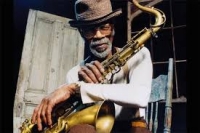
Born in Lima, Ohio, Henderson was one of five sisters and nine brothers. He was encouraged by his parents Dennis and Irene (née Farley) and older brother James T. to study music. He dedicated his first album to them "for being so understanding and tolerant" during his formative years. Early musical interests included drums, piano, saxophone and composition. According to Kenny Dorham, two local piano teachers who went to school with Henderson's brothers and sisters, Richard Patterson and Don Hurless, gave him a knowledge of the piano. He was particularly enamored of his brother's record collection. It seems that a hometown drummer, John Jarette, advised Henderson to listen to musicians like Lester Young, Stan Getz, Dexter Gordon and Charlie Parker. He also liked Flip Phillips, Lee Konitz and the Jazz at the Philharmonic recordings. However, Parker became his greatest inspiration. His first approach to the saxophone was under the tutelage of Herbert Murphy in high school. In this period of time, he wrote several scores for the school band
Joy T. Nilo

Joy T. Nilo (born January 11, 1970) is a Filipino composer who specializes in a cappella choral music. Also an orchestrator, his works range from traditional to modern, ethnic to electronic, serious to popular. He is also a pianist, singer, music conductor and educator.
Erroll Garner
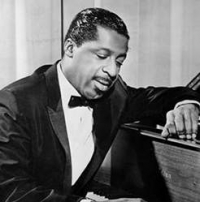
Erroll Louis Garner (June 15, 1921 – January 2, 1977) was an American jazz pianist and composer whose distinctive and melodic style brought him both popular acclaim and the admiration of peers. Of note, Garner was never able to read or write sheet music.
What makes Garner's playing easy to recognize is his trademark introductions, which seem to make no sense until breaking dramatically into his exposition of the tune he will play, and the guitar strumming sound of his left hand, playing crotchet accompaniment to his rich sounding right hand. He places his chords and octaves on syncopated beats that swing very hard and can be used to build excellent tension, such as between phrases. The approach also suggests he was influenced by the iconic rhythm guitar work of Count Basie's long time guitarist, Freddie Green. But discerning listeners could find that while his even four left hand was a fixture, it was far from being the only rhythmic approach he took to playing.
What makes Garner's playing easy to recognize is his trademark introductions, which seem to make no sense until breaking dramatically into his exposition of the tune he will play, and the guitar strumming sound of his left hand, playing crotchet accompaniment to his rich sounding right hand. He places his chords and octaves on syncopated beats that swing very hard and can be used to build excellent tension, such as between phrases. The approach also suggests he was influenced by the iconic rhythm guitar work of Count Basie's long time guitarist, Freddie Green. But discerning listeners could find that while his even four left hand was a fixture, it was far from being the only rhythmic approach he took to playing.
American square dance

A square dance is an American folk dance form that involves four couples in a square formation dancing to a specific sequence or series of steps announced or cued by a caller
Toto
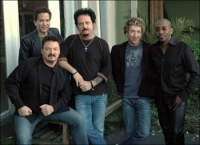
Toto was a Grammy Award winning American rock band founded in 1977 by some of the most popular and experienced session musicians of the era. The band enjoyed great commercial success in the 1980s, beginning with the band's self-titled debut, released in 1978, which immediately brought the band into the mainstream rock spectrum of the time. Continuing with 1982's critically acclaimed and commercially successful Toto IV, Toto became one of the biggest selling music groups of their era. They also composed the theme music for the film Dune. Although their popularity in the United States diminished in the 1990s and 2000s, they continued to tour to sold out arenas, clubs, and theaters internationally. Toto was known for their technical prowess in the studio, as well as a musical style that combines elements of pop, rock, soul, funk, progressive rock, hard rock, R&B, and jazz, making them appeal to a variety of musicians and non-musician listeners. The band has released 17 albums and has sold over 30 million records to date. Their 18th release Falling In Between Live, was released in August 2007. It had been recorded in March 2007 in Paris. As a result of guitarist Steve Lukather's departure from the band, Toto broke up after the last leg of their 2008 tour.
 Sheet Music Max is a site for those who wants to access popular sheet music easily,
letting them download the sheet music for free for trial purposes.
It's completely free to download and try the listed sheet music, but you have to delete the files after 24 hours of trial.
Don't forget, if you like the piece of music you have just learned playing,
treat the artist with respect, and go buy the original sheet music.
Sheet Music Max is a site for those who wants to access popular sheet music easily,
letting them download the sheet music for free for trial purposes.
It's completely free to download and try the listed sheet music, but you have to delete the files after 24 hours of trial.
Don't forget, if you like the piece of music you have just learned playing,
treat the artist with respect, and go buy the original sheet music.